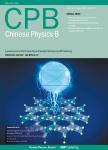Three-step self-calibrating generalized phase-shifting interferometry
Finite-key analysis of practical time-bin high-dimensional quantum key distribution with afterpulse effect作者机构:Institute of Materials PhysicsCollege of ScienceNortheast Electric Power UniversityJilin 132012China State Key Laboratory of Applied OpticsChangchun Institute of OpticsFine Mechanics and PhysicsChinese Academy of SciencesChangchun 130022China
出 版 物:《Chinese Physics B》 (中国物理B(英文版))
年 卷 期:2022年第31卷第8期
页 面:234-240页
核心收录:
学科分类:080903[工学-微电子学与固体电子学] 0809[工学-电子科学与技术(可授工学、理学学位)] 08[工学]
基 金:Project supported by the National Natural Science Foundation of China (Grant No. 61905039) Jilin Scientific and Technological Development Program, China (Grant No. 20190701018GH) Education Department of Jilin Province, China (Grant No. JJKH20190691KJ) State Key Laboratory of Applied Optics
主 题:self-calibrating generalized phase-shifting interferomertry phase shift difference interferograms modulation amplitude
摘 要:An accurate and fast three-step self-calibrating generalized phase-shifting interferomertry(SGPSI) is proposed. In this approach, two new phase-shifting signals are constructed by the difference interferograms normalization and noise suppressing, then the unknown phase shift between the two difference phase-shifting signals is estimated quickly through searching the minimum coefficient of variation of the modulation amplitude, a limited number of pixels are selected to participate in the search process to further save time, and finally the phase is reconstructed through the searched phase shift. Through the reconstruction of phase map by the simulation and experiment, and the comparison with several mature algorithms, the good performance of the proposed algorithm is proved, and it eliminates the limitation of requiring more than three phase-shifting interferograms for high-precision SGPSI. We expect this method to be widely used in the future.



